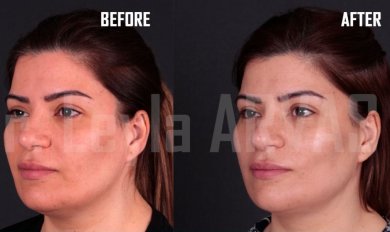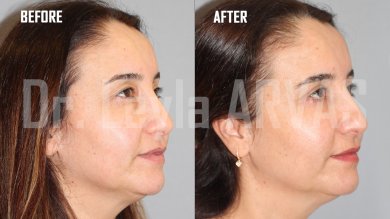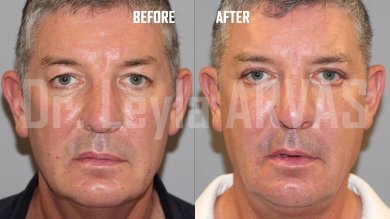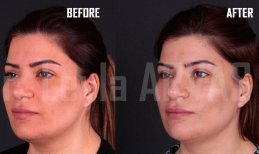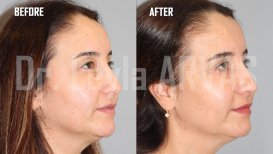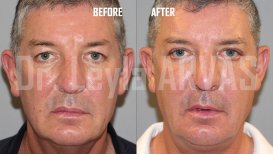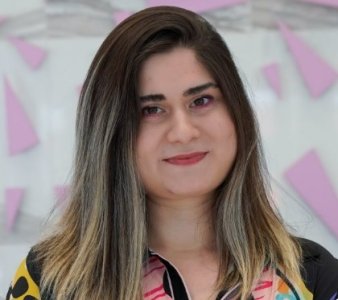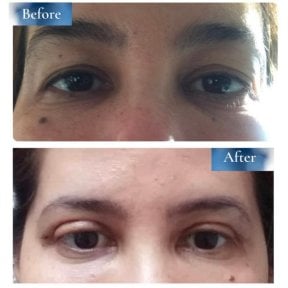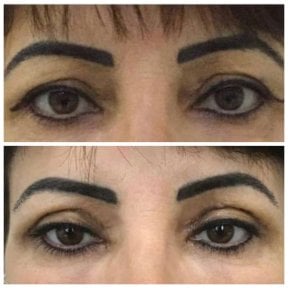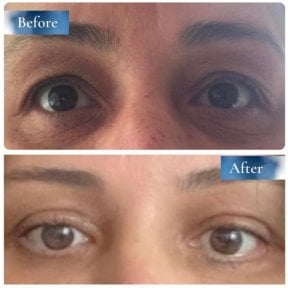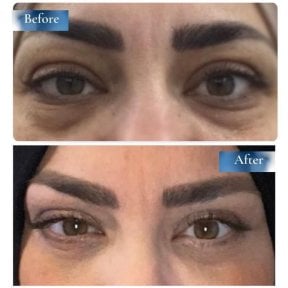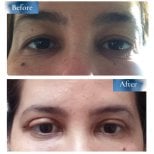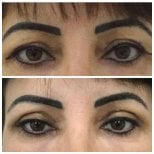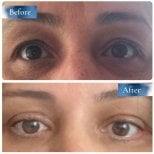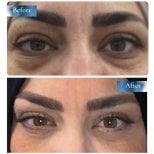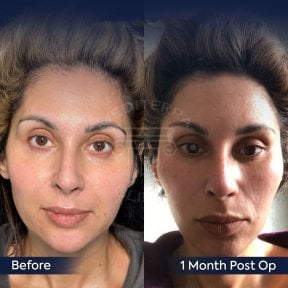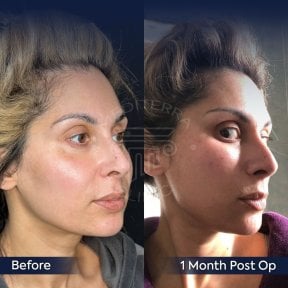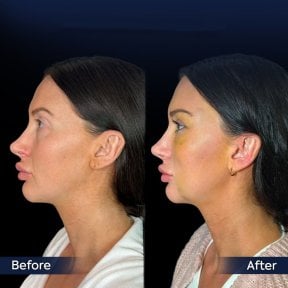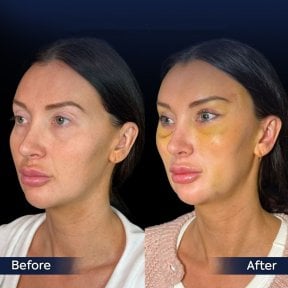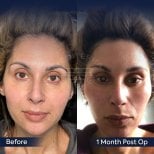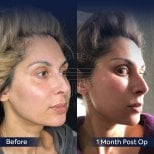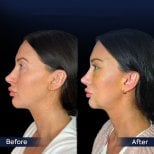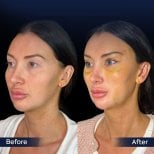Доктор Бурак Пасинлиоглу блефаропластика саласында мамандана отырып, 10 жыл ішінде қабаққа 1 100-ден астам процедура жасады. «Барлығы қосылған» пакетінің құны шамамен 2 650 $ болуы мүмкін — әдетте бұған ота, VIP-трансфер, қонақүйде 6 түн болу және кейінгі күтім кіреді. ISAPS сертификаты бар клиника халықаралық қауіпсіздік стандарттарын сақтайды. Доктор Пасинлиоглу Анкара және Гази университеттерінде білім алған және ISAPS сертификатына ие.
Бұл қалай жұмыс істейді
Түркияда жоғарғы қабақты пластикалаудың бағасы қанша? Қазір біліңіз
Түркияда жоғарғы қабақ пластикасының бағасы $1,500-дан $2,100-ға дейін, Bookimed деректері бойынша. Орташа алғанда операция $1,800 тұрады. Баға клиниканың деңгейіне, хирургтың біліктілігіне, анестезия түріне және қолданылатын материалдарға байланысты.
Әдетте бағаға консультация, талдаулар, анестезия, шығын материалдары, операциядан кейінгі дәрі-дәрмектер, клиникада немесе қонақүйде күтім, бақылау тексерістері, трансферлер және таңғы аспен тұру кіреді. Қосымша қызметтердің, мысалы, жеке сүйемелдеу немесе операциядан кейін ұзартылған бақылаудың бар-жоғын нақтылау қажет.
Медициналық редактор
Фахад Мавлюд2026 жылы Ақпан айындағы Түркияда жоғарғы қабақты пластикалауға бойынша эксклюзивті ұсыныстарды жіберіп алмаңыз
Профессор, доктор Ахмет Сатиджидің 33 жылдық тәжірибесі бар және ол 20 000-нан астам окулопластикалық процедураларды орындаған. Оның Ыстамбұлдағы клиникасында жоғарғы қабаққа жасалатын ота құны шамамен 1 200–1 800 $ құрайды, бұл әдетте процедура мен ауруханада бір күн болу шығындарын қамтиды. JCI аккредитациясы бар мекемеде жұмыс істейтін маман ОКТ және мүйізшақтың топографиялық жүйелерімен жабдықталған арнайы офтальмологиялық орталықты басқарады. Профессор Сатиджи жыл сайын 1 000 ота жасайды және Central Hospital Etiler емханасымен тығыз байланыста.
Доктор Али Садиоглу 13 жыл ішінде Deep Plane әдісіне мамандана отырып, 900-ден астам фейслифтинг отасын жасады. Блефаропластикамен бірге жасалатын бет пен моынға терең лифтинг жасау құны шамамен $7 250 құрайды. Бұл сомаға әдетте хирургтың гонорары, анестезия, стационардағы 1 түн және медбике күтімі бар 4 жұлдызды қонақүйдегі 9 түн кіреді. Еуропалық кеңеспен сертификатталған хирург Реконструктивті микрохирургия қауымдастығының микрохирургия сертификатына ие. Клиника рейтингі 4.8/5 құрайды, ал емделушілердің 95%-ы оны ұсынады.

- Technique: Upper eyelid surgery performed under general anesthesia.
- Sinan Eroglu has presented clinical research internationally, including at the International Congress for Pediatric Surgery in Switzerland.
- Op. Dr. Sinan Eroglu Clinic specializes in cosmetic and functional rhinoplasty, emphasizing personalized and natural-looking transformations.
- Included Services: Post-op medications, medications, general anesthesia, anesthesiologist consultation, post-operative care, follow-up examination, follow-up visit, hospitalization, hotel stay, VIP transfers.
- Stay Info: 1 night hospital room and 2 nights hotel accommodation included in the price, totaling 3 nights in Turkey.
Түркияда ең жақсы Жоғарғы қабақты пластикалау клиникаларын ашыңыз: 4 тексерілген опциялар және бағалар
Istanbul Aesthetic Plastic Surgery Center
Түркияда жоғарғы қабақты пластикалаудың процедурасына шолу
- Блефаропластика (қабақ қалыпқа келтіру) - бастап $1,964Операция барысында көздің шаршаған көрінісін сергітіп, оларды жас әрі тірі ету үшін артық теріні алып тастайды.
- Жоғарғы қабақтың птозын жою - бастап $1,012Бұл процедура қабақтың салбырауын түзетеді, артық тері мен майды алып тастау арқылы сыртқы келбетті және көруді жақсартады.
- Bookimed депозиті: $200 немесе €200.
- Клиника депозиті: Алдын ала белгіленген пайызды төлеңіз.
Түркияда жоғарғы қабақты пластикалаудың медициналық бағалауын алыңыз: 60 тәжірибелі дәрігерлер кеңесіңіз
Барлық дәрігерлерMurat Yaman
Доктор Яман жыл сайын 500-600 процедура орындайды, бет пен денеге жасалатын операциялардың табиғи нәтижелеріне маманданған.
- Эскишехир Османгази және Маниса Желал Баяр университеттерінде білім алған
- Әжімдерді азайтуға, бетті тартуға және дене контурын түзетуге маманданған
- Түрік реконструктивті, эстетикалық және пластикалық хирургия қоғамының мүшесі
- Хаджеттепе университетінде базалық микрохирургия курсын аяқтаған
Muhammet Mustafa Aydinol
Доктор Айдинол жоғары дайындығы мен кәсіби мүшелігіне сүйене отырып, жоғарғы қабақ процедураларына баса назар аударатын эстетикалық пластикалық хирургияға маманданған.
- Халықаралық эстетикалық пластикалық хирургия қоғамының мүшесі
- Эстетикалық және реконструктивті әдістер бойынша жарияланған зерттеулер
- Дикле университетінің пластикалық хирургия клиникасында білім алған
- Дәлдік пен эстетикалық тепе-теңдікті біріктіретін процедураларды орындайды
Ali Sadioglu Md
Түркияның үздік пластикалық хирургтарының қатарына кіреді – Доктор Садиоглу доктор Сафа Манав клиникасында эстетикалық және реконструктивті процедураларға маманданған.
- Анкара университетінің медицина факультетін бітірген
- Гази университетінде (пластикалық хирургия саласындағы көшбасшы) резидентураны аяқтаған
- Беделді микрохирургия сертификатына ие
- Ботулотоксиннің ұзақ мерзімді әсерлері туралы зерттеу жариялаған
Hasan Sahin
Доктор Хасан Шахин Hisar Hospital Intercontinental ауруханасында 12 000-нан астам эстетикалық операцияларды, соның ішінде бетке, қасқа және көзге жасалатын мамандандырылған процедураларды орындады.
- Блефаропластика және қасты көтеру процедуралары бойынша сарапшы
- Краниофациалдық хирургия және микрохирургиялық әдістер бойынша дайындықтан өткен
- Әртүрлі елдерден келген 5 000-нан астам пациентті емдеді
- Бастапқы және күрделі реконструктивті операцияларға маманданған
Bookimed науқастарының бейне тарихтары
Bookimed туралы пікірлер: науқастардың нақты тәжірибесімен танысыңыз
Барлық пікірлерЖоғарғы қабақты пластикалау: Дейін және кейін фотолары
Барлығын қарауОсы контентпен бөлісу
Түркияда жоғарғы қабақты пластикалауға бойынша ЖҚС
Жоғарғы қабақтарға жасалатын блефаропластика кезінде қандай анестезия қолданылады және оның әсерлері қандай?
Жоғарғы қабақ хирургиясы әдетте пациенттің қалауы мен операцияның күрделілігіне байланысты жергілікті анестезиямен седация немесе жалпы анестезияны қолданады. Жергілікті анестезия аймақты ұйықтатады, ал седация сізді босаңсытуға көмектеседі; жалпы анестезия процедура барысында сіздің есіңізді кетіреді. Анестезия нұсқаларын олардың әсерлерін және қалпына келу салдарын түсіну үшін хирургпен талқылаңыз.
Түркия клиникасының немесе ауруханасының осы процедураны ұсынушы қызметкерлерінің біліктілігі мен беделін қалай тексеруге болады?
Аккредитациясын JCI немесе халықаралық медициналық ұйымдармен байланыстарын тексеру арқылы құжаттарын растаңыз. Пациенттердің пікірлері мен куәліктерін оқу клиниканың беделі туралы түсінік бере алады. Форумдар арқылы бұрынғы пациенттермен тікелей байланысу олардың тәжірибелері туралы қосымша көзқарастар ұсынуы мүмкін.
Түркияның медицина мекемелеріндегі жоғарғы қабақ түзету қызметінің сапасы қандай?
Түркияның денсаулық сақтау мекемелері заманауи жабдықтарымен және халықаралық стандарттарға сәйкестігімен танымал. Көптеген ауруханалар JCI сияқты ұйымдармен аккредиттелген, бұл сапалы күтімді қамтамасыз етеді. Мекемелердің аккредитацияларын зерттеу қауіпсіздік пен сапаға сенімділік бере алады.
Ота жасау кезінде жасырын шығындар немесе қосымша төлемдер бар ма?
Көптеген клиникалар толық кешенді пакеттер ұсынғанмен, жасырын шығындардың алдын алу үшін оның не қамтитынын нақтылау маңызды. Дәрі-дәрмектер, кейінгі қабылдаулар немесе ұзартылған тұрғын үйге қатысты қосымша төлемдер туралы сұраңыз. Клиникамен ашық талқылау күтулерді басқаруға көмектеседі.
Түрік хирургімен операция алдындағы консультация үдерісі туралы не білуім керек?
Ота алдындағы кеңес барысында сіздің медициналық тарихыңыз, күтілетін нәтижелер және мүмкін болатын қатерлеріңізді хирургпен талқылау қамтылады. Олардың тәжірибесі, хирургиялық әдістері және операциядан кейінгі күтім жоспарлары туралы сұрақ қою өте маңызды. Бұл кеңес жиі халықаралық пациенттер үшін виртуалды түрде өткізілуі мүмкін.
Отадан кейін үйге оралғаннан кейін қандай да бір асқынулар пайда болса, оларды қалай жеңуге болады?
Үйге қайтқаннан кейін асқынулар пайда болған жағдайда, бірден өзіңіздің хирург дәрігеріңізбен байланысыңыз. Көптеген клиникалар осындай мәселелерді шешу үшін қашықтан кеңес беру қызметін ұсынады. Қажет болған жағдайда, түрік хирургіңізбен байланыс сақтай отырып, жергілікті медициналық көмекке жүгініңіз.
Түрік клиникаларында ота жасататын науқастар үшін жол жүру және орналастыру жағдайлары қандай?
Саяхат топтамалары жиі 4-жұлдызды қонақүйде орналастыруды және әуежай, қонақүй және клиника арасындағы VIP тасымалдау қызметтерін қамтиды. Бұл шаралар халықаралық пациенттерге қолайлық пен ыңғайлылықты қамтамасыз ету үшін жасалған. Брондау алдында топтамаңызға қандай қызметтер кіретінін тексеріңіз.
Отадан кейін үйге қайтқаннан кейін қандай да бір кейінгі күтім немесе қолдау қолжетімді бола ма?
Көптеген клиникалар үйге оралғаннан кейін сіздің қалпына келтіруіңізді бақылау үшін виртуалды консультациялар арқылы кейінгі күтімді қамтамасыз етеді. Операциядан кейін туындауы мүмкін кез-келген мәселелер немесе асқынулар бойынша хирургпен қарым-қатынас жасау маңызды. Түркиядан шығып кетер алдында кейінгі күтімнің процесін түсінетініңізге көз жеткізіңіз.
Медициналық қызметкерлермен қарым-қатынас жасағанда тілдік кедергілерге тап болуым мүмкін бе?
Түркиядағы көптеген клиникалар ағылшын тілінде сөйлейтін қызметкерлерді жұмысқа алады немесе халықаралық пациенттерге көмектесу үшін аударма қызметтерін ұсынады. Клиникамен алғашқы сұрауыңыз кезінде тілдік қолдау мүмкіндігін растау ұсынылады. Бұл сіздің емдеу жолыңызда айқын коммуникацияны қамтамасыз етеді.
Операциядан кейінгі қалпына келу уақыты мен процесі туралы не күтуім керек?
Үстіңгі қабаққа жасалған хирургиялық операциядан қалыпқа келу әдетте 1-ден 2 аптаға дейін уақыт алады, бұл кезеңде ісінулер мен қанталаулар көбіне басылады. Пациенттерге демалу, дене шынықтыру жұмыстарынан аулақ болу және көз күтіміне байланысты тағайындалған нұсқаулықтарды орындау ұсынылады. Қалдық ісіну жоғалғанша толық қалпына келу бірнеше айға созылуы мүмкін.
Түрік хирургінің жоғарғы қабақ хирургиясына біліктілігі мен тәжірибесі бар екеніне қалай көз жеткізуге болады?
Сіздің хирургтыңыздың ISAPS немесе Түрік Пластикалық, Реконструктивтік және Эстетикалық Хирургия Қоғамы секілді беделді ұйымдардан сертификаты бар екеніне көз жеткізіңіз. Олардың біліктілігін, жұмыс тәжірибесінің жылдарын және пациенттердің пікірлерін тексеріңіз. Түркиядағы көптеген хирургтар халықаралық білім алған, бұл олардың кәсібилігінің көрсеткіші болуы мүмкін.
Жоғарғы қабақ блефаропластикасымен байланысты ықтимал қауіптер мен асқынулар қандай?
Жоғарғы қабаққа жасалатын операцияның ықтимал қауіп-қатерлеріне инфекция, қан кету, көздің құрғауы, көзді жабу қиындықтары және симметриясыздық жатады. Бұл қауіп-қатерлерді білікті хирургты таңдау және операциядан кейінгі күтім нұсқауларын ұстану арқылы азайтуға болады. Барлық ықтимал асқынуларды консультация кезінде дәрігеріңізбен талқылау маңызды.
Түркиядағы медицинаның деңгейі қандай?
Денсаулық сақтау – Түркия үкіметінің даму саласының басты бағыттарының бірі. Түркия билігі азаматтардың денсаулығына қамқорлықтың мемлекеттік саясаттың абсолютті приоритеті болуы керектігіне сенімді және денсаулық сақтау үшін жыл сайын шамамен 77 миллиард лира жұмсайды.
Нәтижесінде, 28 000 медициналық мекеме ел көлемінде сапалы медициналық көмек көрсетеді. Шамамен 50 орталық JCI (Дүниежүзілік біріккен комиссия), денсаулық сақтау сапасы мен қауіпсіздігін әлем бойынша жақсартатын халықаралық ұйым сертификаты бар. Алынған сертификаттардың индексі ең үлкен. Салыстырып көретін болсақ, Израильде 20 JCI аккредитацияланған мекеме бар, ал Германияда мұндай тек 10 клиникасы ғана бар.
Сапарға шықпас бұрын Түркия туралы нені білуіңіз керек?
| Валюта | лира (қызметтер үшін доллар және евро арқылы да төлем жасай аласыз) |
| Сапар үшін ең жақсы кезең | Мамыр-қазан |
| Тіл | түрік тілі (медициналық қызметкерлердің көбі ағылшын тілін жетік меңгерген) |
| Виза | әр сапар 30 күннен кем болмаса, талап етілмейді |
| Еуропамен уақыт айырмашылығы | 3 сағат |
| АҚШ-пен уақыт айырмашылығы | 8 сағат |
| Астана | Анкара |
| Медициналық туризм орталығы | Ыстамбұл |
| Танымал курорттар | Аланья, Анталия, Кемер, Мармарис |
Бұл жерде қандай қонақүй қызметтері көрсетіледі?
Түркияда әртүрлі баға деңгейіндегі және қызмет көрсету деңгейі әртүрлі қонақ үйлер ұсынылған. Түрік қонақ үйлерінің деңгейі Тунис, Марокко немесе Египет қонақ үйлерімен салыстырмалы. Көптеген туристер барлығын қамтитын тамақпен 4 және 5 жұлдызды қонақ үйлерді таңдайды. Мұндай қонақ үйлерде жайлы демалыс үшін бәрі бар: әртүрлі ас мәзірі, үлкен әрі күтіп-бапталған аумақ, балалар мен ересектерге арналған анимация. Кейбір қонақ үйлердің өздерінің аквапарктері бар, оны қонақтар тегін пайдалана алады. Бюджеттік саяхатшылар жартылай тамақ немесе еш тамақсыз 3 жұлдызды экономикалық қонақ үйді брондай алады.
Түркияға саяхатқа баруға ең қолайлы уақыт қашан?
Түрік курорттарының негізгі артықшылығы - ұзақ жағажай маусымы. Жерорта теңізі жағалауында ол сәуірде басталып, қарашаға дейін созылады. Эгей теңізі курорттарында — мамырдан қазанға дейін. Шомылуға арналған ең қолайлы уақыт маусымның ортасынан қазанның соңына дейін. Туристердің үлкен легі шілде-тамыз айларында болады, ол кезде ауа температурасы +38°C, ал су +27°C-қа дейін жылынады.
Маған виза қажет пе?
2020 жылы Түркия Республикасы 89 мемлекетпен визаға қатысты келісімдерге ие. Кейбір шетелдіктер кіру визаларын алмайды, басқалары электронды виза (e-Visa) алуы керек, ал тағы басқалары шетелде орналасқан түрік миссияларында визаға өтініш беруі қажет.
Түркияда ем алу үшін қандай мемлекеттерге виза қажет екенін және қандай елдер шекарадан еркін өтті ала беретінін осы жерден оқыңыз.
Түркияда ем алу үшін визаға өтініш беру үшін қандай құжаттар қажет?
Түркияға саяхатқа виза алу үшін құжаттардың саны қажет. Қажетті құжаттарды жоспарланған шығу күнінен 90 күн бұрын тапсыруға болады. Құжаттар тізімі мыналарды қамтиды:
- Жеке куәлік
- онлайн тіркелу мен сауалнаманы толтыруды растау
- кіріс туралы анықтама және қаржының бар екендігін растау ($50 күніне адам басына)
- Түркияда болу үшін сақтандыру полисі (түпнұсқа және көшірме)
- 2 фотосурет (5x6)
- виза түбіртегі
- ұшақ және қонақүй брондау
- емделу қажеттілігі туралы медициналық қорытынды.

